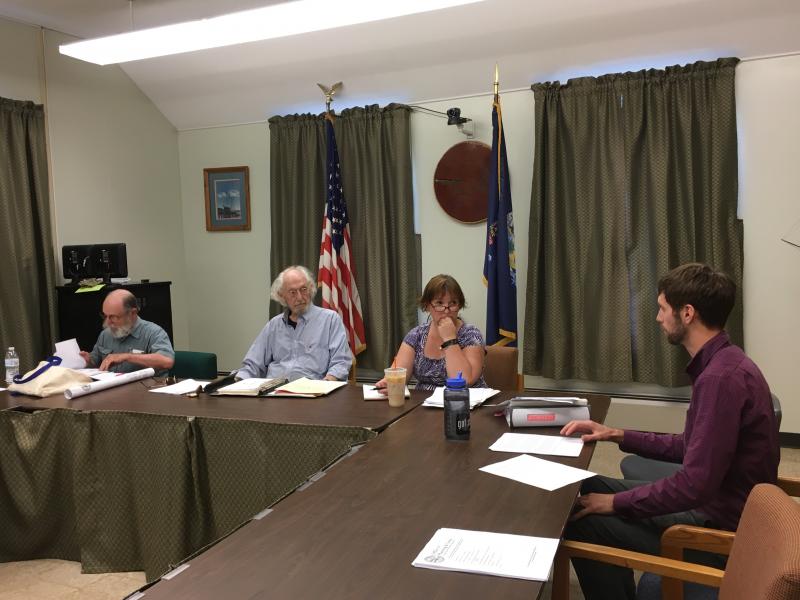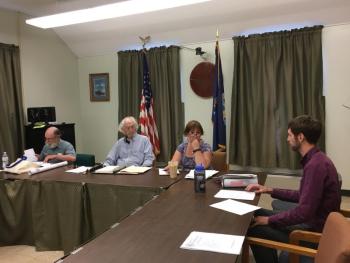Preservation panel wants in on fed review of MDOT project
 From left, member Gordon Kontrath, Chairman John Reinhardt, member Wendy Donovan and Town Planner Ben Averill take part in the Wiscasset Historic Preservation Commission’s June 30 meeting. SUSAN JOHNS/Wiscasset Newspaper
From left, member Gordon Kontrath, Chairman John Reinhardt, member Wendy Donovan and Town Planner Ben Averill take part in the Wiscasset Historic Preservation Commission’s June 30 meeting. SUSAN JOHNS/Wiscasset Newspaper
 From left, member Gordon Kontrath, Chairman John Reinhardt, member Wendy Donovan and Town Planner Ben Averill take part in the Wiscasset Historic Preservation Commission’s June 30 meeting. SUSAN JOHNS/Wiscasset Newspaper
From left, member Gordon Kontrath, Chairman John Reinhardt, member Wendy Donovan and Town Planner Ben Averill take part in the Wiscasset Historic Preservation Commission’s June 30 meeting. SUSAN JOHNS/Wiscasset Newspaper
When a federally assembled panel looks at the state’s plans for downtown, the Wiscasset Historic Preservation Commission wants a seat, or five, at the table.
“I think we want to be players in this,” Jib Fowles told fellow commission members June 30.
The commission decided unanimously to pursue being a consulting party. The local panel has to apply for the status and, in case the commission is turned away, members discussed a backup plan. Fowles and Susan Blagden offered to try to get approved on their own as well.
Fowles and Averill agreed to work together on a letter arguing the commission’s eligibility for the consulting party status. The letter should also say why the commission wants to help, Averill said.
“They’re looking for someone who can prove that they can contribute to the conversation and has reason to be in the conversation,” he said.
Averill told the panel it was his strong suggestion that they apply individually, not as a commission, because only one or two people from any one group would be accepted as consulting parties.
“I’m not saying you can’t do it ... They are looking for as much representation from the town as a whole as possible ... As an individual you have a better likelihood of being approved ... I’m worried that if the commission as a whole (applies) that it’s going to be disapproved.”
However, members favored asking as a commission in addition to Fowles and Blagden trying separately.
“If we get denied (as the group) because they think there are too many of us and we’re big and scary or whatever ... we’d still have a representative” in whoever was picked individually, member Wendy Donovan said.
According to materials Averill handed out, the federal review stems from Section 106 of the National Historic Preservation Act. Section 106 calls for federal agencies to consider their projects’ effects on historic properties. It applies to the Maine Department of Transportation’s downtown project because federal funding is involved, Averill said.
Commission loses member
Gordon Kontrath did not seek appointment to a second term, so the June 30 meeting was his last as a member, he said. He might return as an alternate, Kontrath said.
In the meeting and an interview afterward, he voiced frustration over the reception he feels the new panel has gotten from the select and planning boards. Both boards have dealt with projects the commission should have been consulted on, Kontrath said.
“I’ve been there, done that,” Kontrath said, referring to his work on another preservation panel before he moved to Maine. If a commission isn’t part of a town’s decision-making on matters that can affect historic character, then what’s the point, he said.
“You need to go and stand on the desks of the select board and the planning board ... Make sure they know you’re here and you have a job to do.”
Chairman John Reinhardt also criticized selectmen, claiming they don’t know the 2015 ordinance. “You’re absolutely a thousand percent right,” he told Kontrath. Reinhardt suggested that, when selectmen have the public comment portion of their meetings, commission members could read excerpts from the ordinance.
Messages seeking comment from the boards’ chairmen were not immediately returned.
Members praised Kontrath’s work on the commission and he praised them as having a world of knowledge and a love for the town.
Reinhardt suggested seeking someone from the business community to fill the commission’s fifth seat.
First one done
The commission approved its first-ever certificate of appropriateness. James Cochan and Kim Dolce sought it for their plan to renovate an 1800s, former carriage house at 31 Fort Hill Street, into a home and gallery.
Minutes after agreeing to the certificate, the panel approved its second one, for Cochan’s sign at his gallery, James L. Cochan Fine Art & Antiques in leased space at 75 Main Street. The 18-inch-by-36-inch, enamel-painted wood sign has a black background and silver lettering, satisfying the look the town requires for signs in that area, Averill said.
Asked afterward for comment on the 5-0 outcome for their renovation proposal, Cochan and Dolce both said, “Relief.”
“I think (the application) was a good one for them to cut their teeth on,” because changes made in recent decades left little of the original building, so it was not a preservation project, Dolce said.
Blagden, interviewed separately, said the approval process went “pretty smoothly. The commission did its homework and the applicant did theirs.”
The commission meets next at 5 p.m., Aug. 4, at the municipal building.
Event Date
Address
United States






















